虚拟语态(3)
虚拟语态
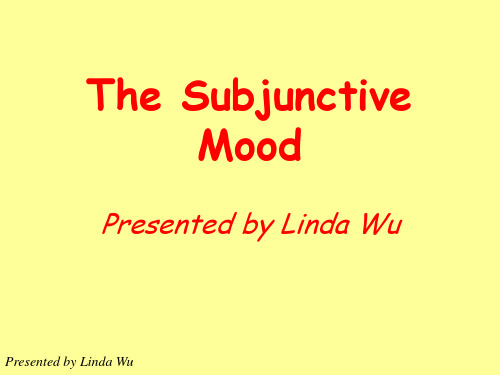
Presented by Linda Wu
含蓄条件一般用如下的语法手段表示
4.介词词组 要不是机组人员,飞机就坠毁了. But for the crew, the plane would have crashed.
Presented by Linda Wu
3.与将来事实相反
如果明天天气好, 我们就继续收割庄稼. If it should be fine tomorrow, we would go on with our harvest. 如果我们有足够的时间,我们可以讨论那 个问题. If we were to have enough time, we could discuss the matter. 如果有我的信,请替我放在抽屉里. If there should be a letter for me, please keep it in the drawer.
Presented by Linda Wu
注意一:HOPE,EXPECT后接的 宾语从句中用陈述语气.
I hope/expect that my dream will come true. (There is much hope.) I wish that my dream would come true. (There is little hope.)
虚拟语态
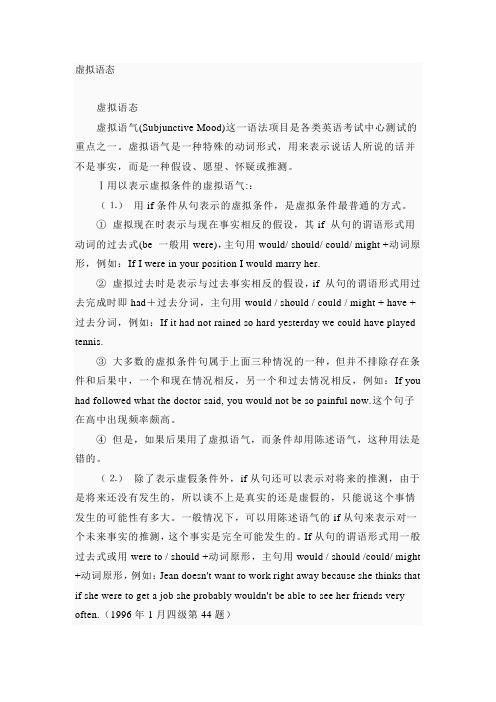
虚拟语态
虚拟语态
虚拟语气(Subjunctive Mood)这一语法项目是各类英语考试中心测试的重点之一。虚拟语气是一种特殊的动词形式,用来表示说话人所说的话并不是事实,而是一种假设、愿望、怀疑或推测。
Ⅰ用以表示虚拟条件的虚拟语气::
(⒈)用if条件从句表示的虚拟条件,是虚拟条件最普通的方式。
①虚拟现在时表示与现在事实相反的假设,其if 从句的谓语形式用动词的过去式(be 一般用were),主句用would/ should/ could/ might +动词原形,例如:If I were in your position I would marry her.
②虚拟过去时是表示与过去事实相反的假设,if 从句的谓语形式用过去完成时即had+过去分词,主句用would / should / could / might + have +过去分词,例如:If it had not rained so hard yesterday we could have played tennis.
③大多数的虚拟条件句属于上面三种情况的一种,但并不排除存在条件和后果中,一个和现在情况相反,另一个和过去情况相反,例如:If you had followed what the doctor said, you would not be so painful now.这个句子在高中出现频率颇高。
④但是,如果后果用了虚拟语气,而条件却用陈述语气,这种用法是错的。
(⒉)除了表示虚假条件外,if从句还可以表示对将来的推测,由于是将来还没有发生的,所以谈不上是真实的还是虚假的,只能说这个事情发生的可能性有多大。一般情况下,可以用陈述语气的if从句来表示对一个未来事实的推测,这个事实是完全可能发生的。If从句的谓语形式用一般过去式或用were to / should +动词原形,主句用would / should /could/ might +动词原形,例如:Jean doesn't want to work right away because she thinks that if she were to get a job she probably wouldn't be able to see her friends very often.(1996年1月四级第44题)
虚拟语态
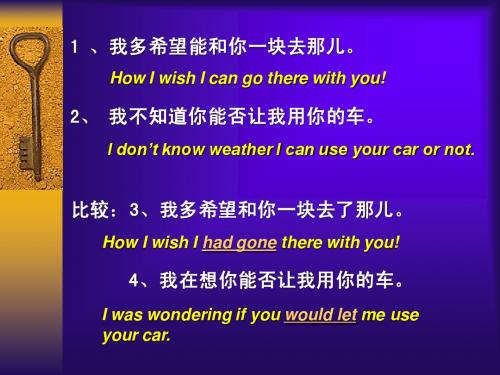
表示对将来情况的虚拟: 3. 表示对将来情况的虚拟:
If he should come / came / were to come, I should / would / could / might ask him about it. If there should be / were / were to be something wrong, they would / could / might let you know at once.
常用于主句中的adj. 和 v (p.p) 有: 常用于主句中的
best, better, desirable(称心如意的), fitting(适合的), important, preferable (更好的), proper, decided (无疑的,果断的), ordered (井然有序的, 有规律的), recommended, requested, required 等
1 、我多希望能和你一块去那儿。 我多希望能和你一块去那儿。
How I wish I can go there with you!
2、 我不知道你能否让我用你的车。 我不知道你能否让我用你的车。
I don’t know weather I can use your car or not.
比较:3、我多希望和你一块去了那儿。 比较: 我多希望和你一块去了那儿。
虚拟语态
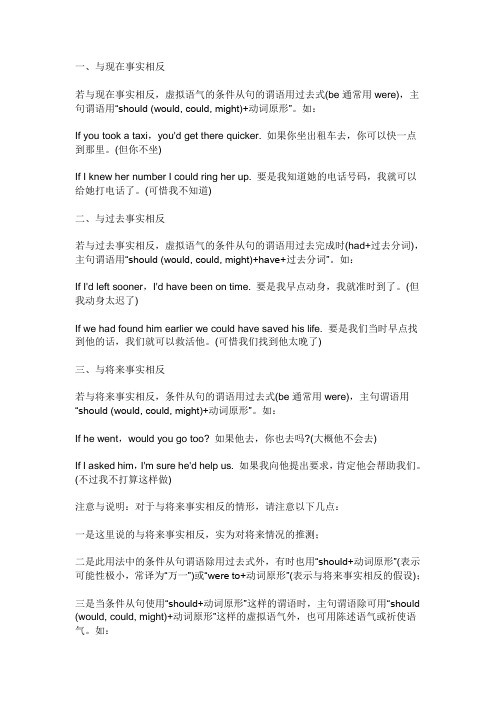
一、与现在事实相反
若与现在事实相反,虚拟语气的条件从句的谓语用过去式(be通常用were),主句谓语用“should (would, could, might)+动词原形”。如:
If you took a taxi,you'd get there quicker. 如果你坐出租车去,你可以快一点到那里。(但你不坐)
If I knew her number I could ring her up. 要是我知道她的电话号码,我就可以给她打电话了。(可惜我不知道)
二、与过去事实相反
若与过去事实相反,虚拟语气的条件从句的谓语用过去完成时(had+过去分词),主句谓语用“should (would, could, might)+have+过去分词”。如:
If I'd left sooner,I'd have been on time. 要是我早点动身,我就准时到了。(但我动身太迟了)
If we had found him earlier we could have saved his life. 要是我们当时早点找到他的话,我们就可以救活他。(可惜我们找到他太晚了)
三、与将来事实相反
若与将来事实相反,条件从句的谓语用过去式(be通常用were),主句谓语用“should (would, could, might)+动词原形”。如:
If he went,would you go too? 如果他去,你也去吗?(大概他不会去)
If I asked him,I'm sure he'd help us. 如果我向他提出要求,肯定他会帮助我们。(不过我不打算这样做)
虚拟语态知识点总结
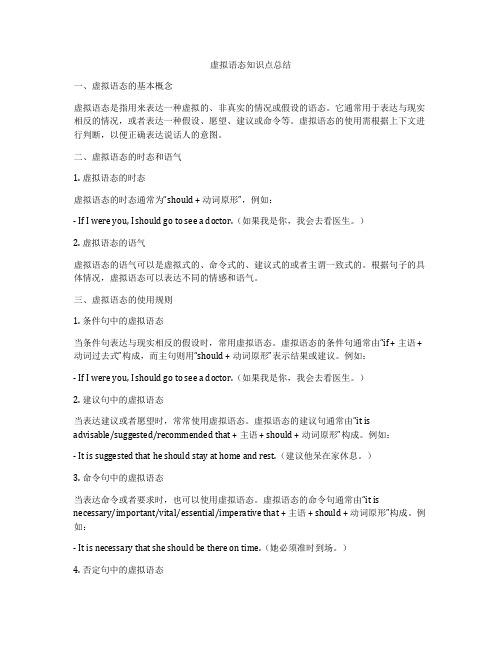
虚拟语态知识点总结
一、虚拟语态的基本概念
虚拟语态是指用来表达一种虚拟的、非真实的情况或假设的语态。它通常用于表达与现实相反的情况,或者表达一种假设、愿望、建议或命令等。虚拟语态的使用需根据上下文进行判断,以便正确表达说话人的意图。
二、虚拟语态的时态和语气
1. 虚拟语态的时态
虚拟语态的时态通常为“should + 动词原形”,例如:
- If I were you, I should go to see a doctor.(如果我是你,我会去看医生。)
2. 虚拟语态的语气
虚拟语态的语气可以是虚拟式的、命令式的、建议式的或者主谓一致式的。根据句子的具体情况,虚拟语态可以表达不同的情感和语气。
三、虚拟语态的使用规则
1. 条件句中的虚拟语态
当条件句表达与现实相反的假设时,常用虚拟语态。虚拟语态的条件句通常由“if + 主语 + 动词过去式”构成,而主句则用“should + 动词原形”表示结果或建议。例如:
- If I were you, I should go to see a doctor.(如果我是你,我会去看医生。)
2. 建议句中的虚拟语态
当表达建议或者愿望时,常常使用虚拟语态。虚拟语态的建议句通常由“it is
advisable/suggested/recommended that + 主语 + should + 动词原形”构成。例如:
- It is suggested that he should stay at home and rest.(建议他呆在家休息。)
3. 命令句中的虚拟语态
虚拟语态的知识点总结
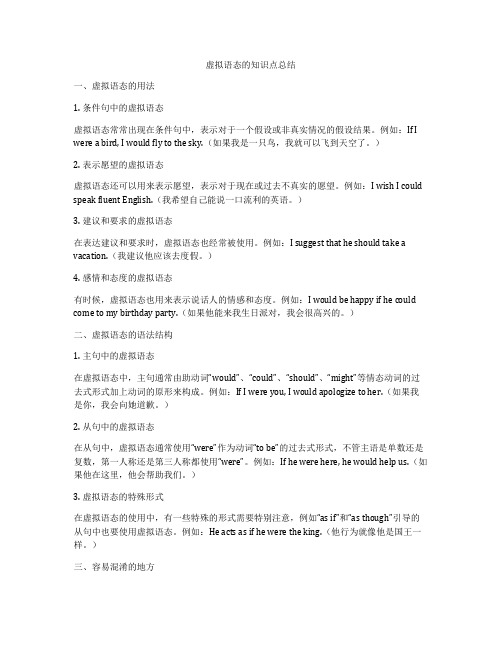
虚拟语态的知识点总结
一、虚拟语态的用法
1. 条件句中的虚拟语态
虚拟语态常常出现在条件句中,表示对于一个假设或非真实情况的假设结果。例如:If I were a bird, I would fly to the sky.(如果我是一只鸟,我就可以飞到天空了。)
2. 表示愿望的虚拟语态
虚拟语态还可以用来表示愿望,表示对于现在或过去不真实的愿望。例如:I wish I could speak fluent English.(我希望自己能说一口流利的英语。)
3. 建议和要求的虚拟语态
在表达建议和要求时,虚拟语态也经常被使用。例如:I suggest that he should take a vacation.(我建议他应该去度假。)
4. 感情和态度的虚拟语态
有时候,虚拟语态也用来表示说话人的情感和态度。例如:I would be happy if he could come to my birthday party.(如果他能来我生日派对,我会很高兴的。)
二、虚拟语态的语法结构
1. 主句中的虚拟语态
在虚拟语态中,主句通常由助动词“would”、“could”、“should”、“might”等情态动词的过去式形式加上动词的原形来构成。例如:If I were you, I would apologize to her.(如果我是你,我会向她道歉。)
2. 从句中的虚拟语态
在从句中,虚拟语态通常使用“were”作为动词“to be”的过去式形式,不管主语是单数还是复数,第一人称还是第三人称都使用“were”。例如:If he were here, he would help us.(如果他在这里,他会帮助我们。)
虚拟语气的三种时态表格
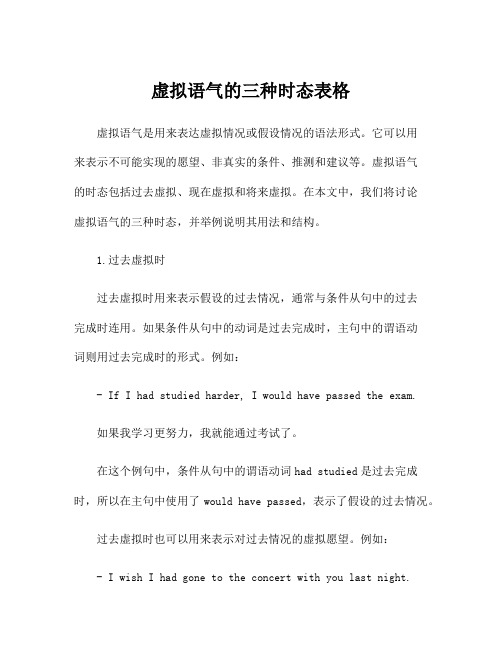
虚拟语气的三种时态表格
虚拟语气是用来表达虚拟情况或假设情况的语法形式。它可以用
来表示不可能实现的愿望、非真实的条件、推测和建议等。虚拟语气
的时态包括过去虚拟、现在虚拟和将来虚拟。在本文中,我们将讨论
虚拟语气的三种时态,并举例说明其用法和结构。
1.过去虚拟时
过去虚拟时用来表示假设的过去情况,通常与条件从句中的过去
完成时连用。如果条件从句中的动词是过去完成时,主句中的谓语动
词则用过去完成时的形式。例如:
- If I had studied harder, I would have passed the exam.
如果我学习更努力,我就能通过考试了。
在这个例句中,条件从句中的谓语动词had studied是过去完成时,所以在主句中使用了would have passed,表示了假设的过去情况。
过去虚拟时也可以用来表示对过去情况的虚拟愿望。例如:
- I wish I had gone to the concert with you last night.
我希望昨晚我能和你一起去听音乐会。
在这个例句中,使用了过去虚拟时来表达对已经发生的情况的虚
拟愿望。
2.现在虚拟时
现在虚拟时用来表示对现在情况的虚拟假设,通常与条件从句中
的过去时连用。如果条件从句中的谓语动词是过去时,主句中的谓语
动词则用现在虚拟时的形式。例如:
- If I were you, I would buy that car.
如果我是你,我会买那辆车。
在这个例句中,条件从句中的谓语动词were是过去时,所以在主
句中使用了would buy,表示了对现在情况的虚拟假设。
情态动词及虚拟语态
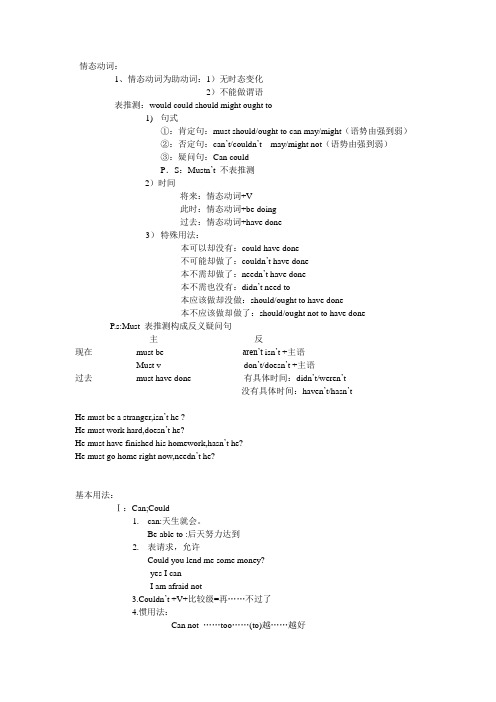
情态动词:
1、情态动词为助动词:1)无时态变化
2)不能做谓语
表推测:would could should might ought to
1)句式
①:肯定句:must should/ought to can may/might(语势由强到弱)
②:否定句:can’t/couldn’t may/might not(语势由强到弱)
③:疑问句:Can could
P.S:Mustn’t 不表推测
2)时间
将来:情态动词+V
此时:情态动词+be doing
过去:情态动词+have done
3)特殊用法:
本可以却没有:could have done
不可能却做了:couldn’t have done
本不需却做了:needn’t have done
本不需也没有:didn’t need to
本应该做却没做:should/ought to have done
本不应该做却做了:should/ought not to have done P.s:Must 表推测构成反义疑问句
主反
现在must be aren’t isn’t +主语
Must v don’t/doesn’t +主语
过去must have done 有具体时间:didn’t/weren’t
没有具体时间:haven’t/hasn’t
He must be a stranger,isn’t he ?
He must work hard,doesn’t he?
He must have finished his homework,hasn’t he?
He must go home right now,needn’t he?
虚拟语气的三种时态表格
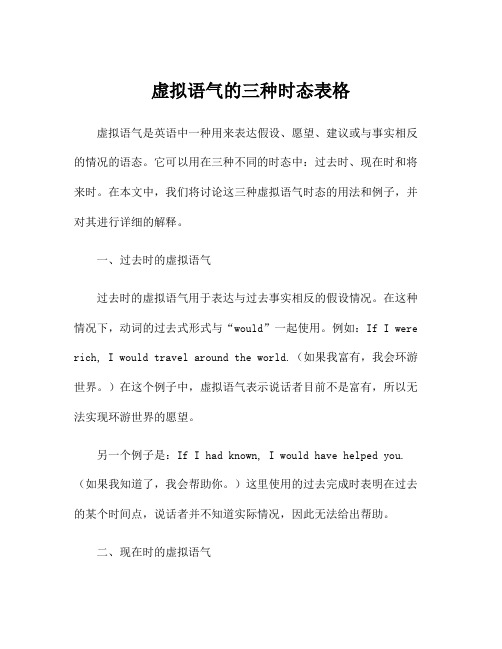
虚拟语气的三种时态表格
虚拟语气是英语中一种用来表达假设、愿望、建议或与事实相反的情况的语态。它可以用在三种不同的时态中:过去时、现在时和将来时。在本文中,我们将讨论这三种虚拟语气时态的用法和例子,并对其进行详细的解释。
一、过去时的虚拟语气
过去时的虚拟语气用于表达与过去事实相反的假设情况。在这种情况下,动词的过去式形式与“would”一起使用。例如:If I were rich, I would travel around the world.(如果我富有,我会环游世界。)在这个例子中,虚拟语气表示说话者目前不是富有,所以无法实现环游世界的愿望。
另一个例子是:If I had known, I would have helped you.(如果我知道了,我会帮助你。)这里使用的过去完成时表明在过去的某个时间点,说话者并不知道实际情况,因此无法给出帮助。
二、现在时的虚拟语气
现在时的虚拟语气用于表达与现实情况相反的假设,或者表达建议或愿望。在这种情况下,动词的一般过去式形式与“would”或“could”一起使用。例如:If I were you, I would go to the doctor.(如果我是你,我会去看医生。)在这个例子中,虚拟语气表示说话者目前并不是对方,但是要表达对方应该去看医生的建议。
另一个例子是:I wish I had more time.(我希望我有更多的时间。)这里使用的愿望句式表达说话者对现实情况的不满,希望自己能够有更多的时间。
三、将来时的虚拟语气
将来时的虚拟语气用于表示与未来情况相反的假设情况。在这种情况下,动词的一般过去式形式与“would”或“could”一起使用。例如:If I were to win the lottery, I would buy a big house.(如果我中了彩票,我会买一幢大房子。)在这个例子中,虚拟语气表示说话者认为赢得彩票是不太可能的情况。
英语虚拟语气的三种时态
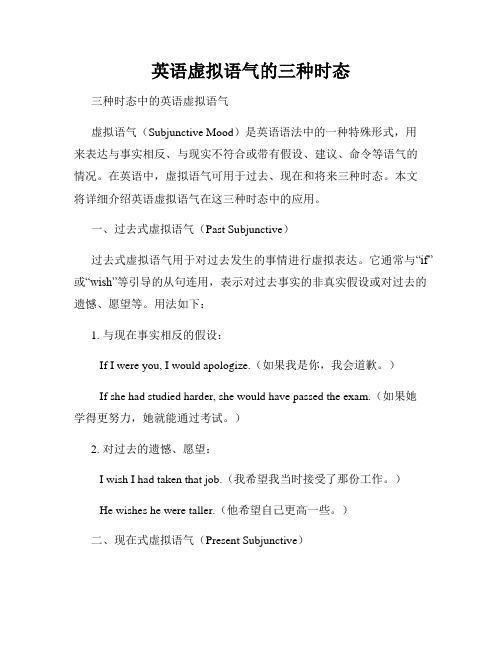
英语虚拟语气的三种时态
三种时态中的英语虚拟语气
虚拟语气(Subjunctive Mood)是英语语法中的一种特殊形式,用
来表达与事实相反、与现实不符合或带有假设、建议、命令等语气的
情况。在英语中,虚拟语气可用于过去、现在和将来三种时态。本文
将详细介绍英语虚拟语气在这三种时态中的应用。
一、过去式虚拟语气(Past Subjunctive)
过去式虚拟语气用于对过去发生的事情进行虚拟表达。它通常与“if”或“wish”等引导的从句连用,表示对过去事实的非真实假设或对过去的遗憾、愿望等。用法如下:
1. 与现在事实相反的假设:
If I were you, I would apologize.(如果我是你,我会道歉。)
If she had studied harder, she would have passed the exam.(如果她
学得更努力,她就能通过考试。)
2. 对过去的遗憾、愿望:
I wish I had taken that job.(我希望我当时接受了那份工作。)
He wishes he were taller.(他希望自己更高一些。)
二、现在式虚拟语气(Present Subjunctive)
现在式虚拟语气用于对现在或将来的事情进行虚拟表达。它通常与“if”或“suggest”等引导的从句连用,表示对现实的非真实假设、建议或
要求。用法如下:
1. 对现在事实相反的假设:
If it were to rain, we would stay at home.(如果下雨的话,我们将呆在家里。)
虚拟语气的用法
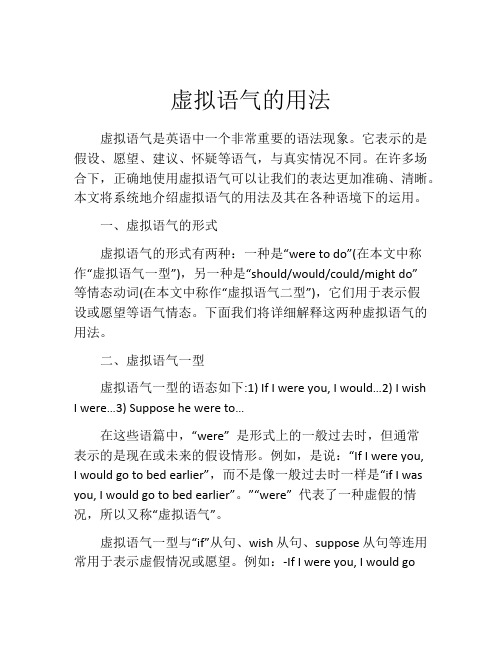
虚拟语气的用法
虚拟语气是英语中一个非常重要的语法现象。它表示的是假设、愿望、建议、怀疑等语气,与真实情况不同。在许多场合下,正确地使用虚拟语气可以让我们的表达更加准确、清晰。本文将系统地介绍虚拟语气的用法及其在各种语境下的运用。
一、虚拟语气的形式
虚拟语气的形式有两种:一种是“were to do”(在本文中称
作“虚拟语气一型”),另一种是“should/would/could/might do”
等情态动词(在本文中称作“虚拟语气二型”),它们用于表示假
设或愿望等语气情态。下面我们将详细解释这两种虚拟语气的用法。
二、虚拟语气一型
虚拟语气一型的语态如下:1) If I were you, I would…2) I wish I were…3) Suppose he were to…
在这些语篇中,“were” 是形式上的一般过去时,但通常
表示的是现在或未来的假设情形。例如,是说:“If I were you,
I would go to bed earlier”,而不是像一般过去时一样是“i f I was you, I would go to bed earlier”。”“were” 代表了一种虚假的情况,所以又称“虚拟语气”。
虚拟语气一型与“if”从句、wish从句、suppose从句等连用常用于表示虚假情况或愿望。例如:-If I were you, I would go
to bed earlier. (如果我是你,我会早睡)-I wish I were rich. (我希
望我有钱)-Suppose he were to come today, what would you say
虚拟语态

<br>
<br>
<br>
<br>
<br>
<br>
<br>
<br>
<br>
<br>
虚拟语态
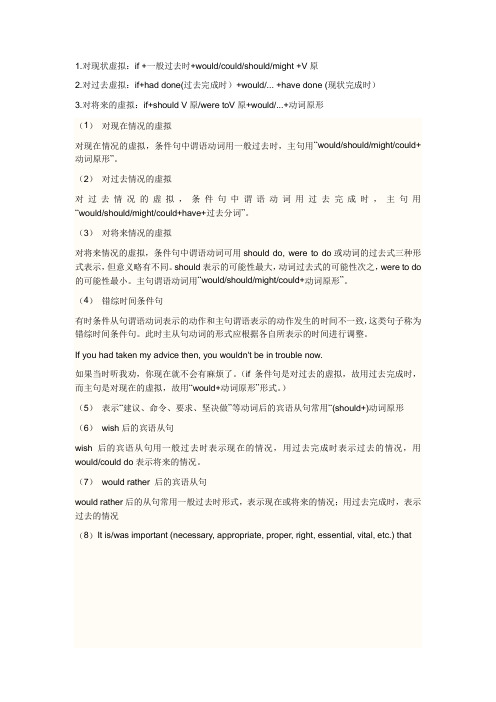
1.对现状虚拟:if +一般过去时+would/could/should/might +V原
2.对过去虚拟:if+had done(过去完成时)+would/... +have done (现状完成时)
3.对将来的虚拟:if+should V原/were toV原+would/...+动词原形
(1)对现在情况的虚拟
对现在情况的虚拟,条件句中谓语动词用一般过去时,主句用“would/should/might/could+动词原形”。
(2)对过去情况的虚拟
对过去情况的虚拟,条件句中谓语动词用过去完成时,主句用“would/should/might/could+have+过去分词”。
(3)对将来情况的虚拟
对将来情况的虚拟,条件句中谓语动词可用should do, were to do或动词的过去式三种形式表示,但意义略有不同。should表示的可能性最大,动词过去式的可能性次之,were to do 的可能性最小。主句谓语动词用“would/should/might/could+动词原形”。
(4)错综时间条件句
有时条件从句谓语动词表示的动作和主句谓语表示的动作发生的时间不一致,这类句子称为错综时间条件句。此时主从句动词的形式应根据各自所表示的时间进行调整。
If you had taken my advice then, you wouldn't be in trouble now.
如果当时听我劝,你现在就不会有麻烦了。(if条件句是对过去的虚拟,故用过去完成时,而主句是对现在的虚拟,故用“would+动词原形”形式。)
虚拟语态的各种用法及练习
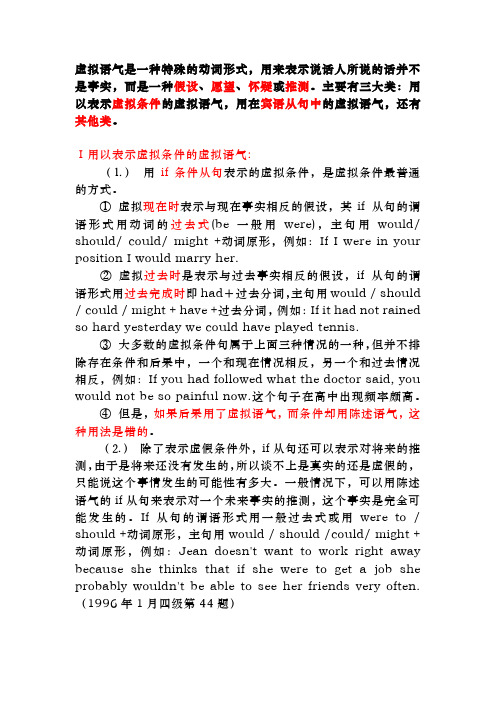
虚拟语气是一种特殊的动词形式,用来表示说话人所说的话并不是事实,而是一种假设、愿望、怀疑或推测。主要有三大类:用以表示虚拟条件的虚拟语气,用在宾语从句中的虚拟语气,还有其他类。
Ⅰ用以表示虚拟条件的虚拟语气:
(⒈)用if条件从句表示的虚拟条件,是虚拟条件最普通的方式。
① 虚拟现在时表示与现在事实相反的假设,其if 从句的谓语形式用动词的过去式(be 一般用were),主句用would/ should/ could/ might +动词原形,例如:If I were in your position I would marry her.
② 虚拟过去时是表示与过去事实相反的假设,if 从句的谓语形式用过去完成时即had+过去分词,主句用would / should / could / might + have +过去分词,例如:If it had not rained so hard yesterday we could have played tennis.
③ 大多数的虚拟条件句属于上面三种情况的一种,但并不排除存在条件和后果中,一个和现在情况相反,另一个和过去情况相反,例如:If you had followed what the doctor said, you would not be so painful now.这个句子在高中出现频率颇高。
④ 但是,如果后果用了虚拟语气,而条件却用陈述语气,这种用法是错的。
(⒉)除了表示虚假条件外,if从句还可以表示对将来的推测,由于是将来还没有发生的,所以谈不上是真实的还是虚假的,只能说这个事情发生的可能性有多大。一般情况下,可以用陈述语气的if从句来表示对一个未来事实的推测,这个事实是完全可能发生的。If从句的谓语形式用一般过去式或用were to / should +动词原形,主句用would / should /could/ might +动词原形,例如:Jean doesn't want to work right away because she thinks that if she were to get a job she probably wouldn't be able to see her friends very often.(1996年1月四级第44题)
虚拟语态知识点总结英语
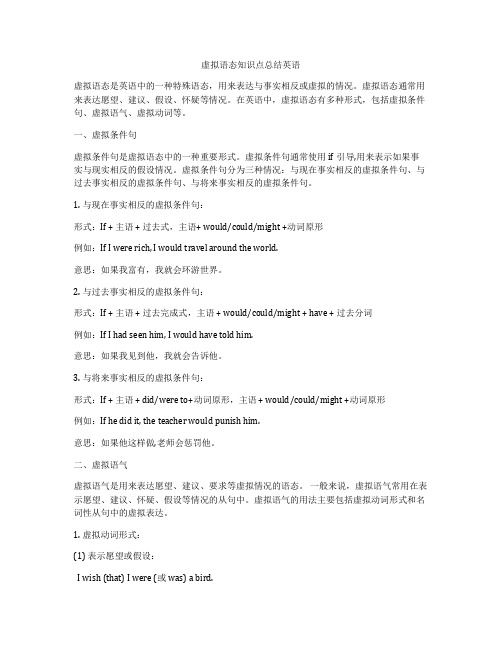
虚拟语态知识点总结英语
虚拟语态是英语中的一种特殊语态,用来表达与事实相反或虚拟的情况。虚拟语态通常用来表达愿望、建议、假设、怀疑等情况。在英语中,虚拟语态有多种形式,包括虚拟条件句、虚拟语气、虚拟动词等。
一、虚拟条件句
虚拟条件句是虚拟语态中的一种重要形式。虚拟条件句通常使用if引导,用来表示如果事实与现实相反的假设情况。虚拟条件句分为三种情况:与现在事实相反的虚拟条件句、与过去事实相反的虚拟条件句、与将来事实相反的虚拟条件句。
1. 与现在事实相反的虚拟条件句:
形式:If + 主语 + 过去式,主语+ would/could/might +动词原形
例如:If I were rich, I would travel around the world.
意思:如果我富有,我就会环游世界。
2. 与过去事实相反的虚拟条件句:
形式:If + 主语 + 过去完成式,主语 + would/could/might + have + 过去分词
例如:If I had seen him, I would have told him.
意思:如果我见到他,我就会告诉他。
3. 与将来事实相反的虚拟条件句:
形式:If + 主语 + did/were to+动词原形,主语 + would/could/might +动词原形
例如:If he did it, the teacher would punish him.
意思:如果他这样做,老师会惩罚他。
二、虚拟语气
虚拟语气是用来表达愿望、建议、要求等虚拟情况的语态。一般来说,虚拟语气常用在表示愿望、建议、怀疑、假设等情况的从句中。虚拟语气的用法主要包括虚拟动词形式和名词性从句中的虚拟表达。
虚拟语态
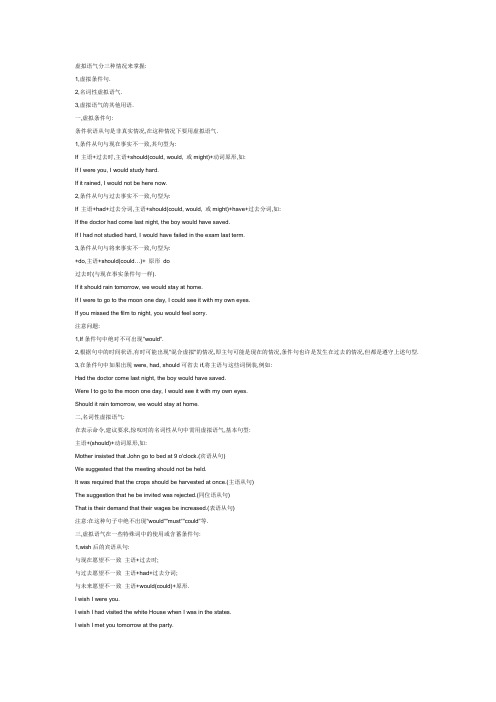
虚拟语气分三种情况来掌握:
1,虚拟条件句.
2,名词性虚拟语气.
3,虚拟语气的其他用语.
一,虚拟条件句:
条件状语从句是非真实情况,在这种情况下要用虚拟语气.
1,条件从句与现在事实不一致,其句型为:
If 主语+过去时,主语+should(could, would, 或might)+动词原形,如:
If I were you, I would study hard.
If it rained, I would not be here now.
2,条件从句与过去事实不一致,句型为:
If 主语+had+过去分词,主语+should(could, would, 或might)+have+过去分词,如:
If the doctor had come last night, the boy would have saved.
If I had not studied hard, I would have failed in the exam last term.
3,条件从句与将来事实不一致,句型为:
+do,主语+should(could…)+ 原形do
过去时(与现在事实条件句一样).
If it should rain tomorrow, we would stay at home.
If I were to go to the moon one day, I could see it with my own eyes.
If you missed the film to night, you would feel sorry.
- 1、下载文档前请自行甄别文档内容的完整性,平台不提供额外的编辑、内容补充、找答案等附加服务。
- 2、"仅部分预览"的文档,不可在线预览部分如存在完整性等问题,可反馈申请退款(可完整预览的文档不适用该条件!)。
- 3、如文档侵犯您的权益,请联系客服反馈,我们会尽快为您处理(人工客服工作时间:9:00-18:30)。
二、虚拟语态在其他从句中的运用 1.在wish, as if/as though从句中的运用 对现在的假设:that 主语+动词过去时 (were) 表示过去的假设:had+过去分词 表示将来的愿望:would/could+动词原形
• I wish that he weren’t so lazy. • He wished that he were a leader. • I wish that he had not made so much fuss about it. • I wish I had a better memory.
• • •
句型:if it (be) not for …..主语。。。(视 具体情况而定),功能相当于but for …. If it had not been for your help, we would not have achieved so much in our work. If it were not for the leadership of the party, we could not be living a happy life now.
•
•
• •
•
If I were any younger, I’ll fill in love with you. If you asked me nicely, I might take you out to lunch. If he were alive today, he would be a hero. If I had the wings of a dove, I should fly to you. If this wer来自百度文库 true, I would be sorry for it.
• 2.含蓄条件句中的运用:条件隐含在一 个介词中如,without, bur for, but that 引 起的短语中,连词but,副词otherwise,比较 级等表示的上下文中。 • Without electricity, there would be no modern industry. • But for your cooperation, we could not have succeeded in our experiment. • But that he was afraid, she could have said so. • I would be more glad to help you, but I’m busy now.
• 2.if only 引起的感叹句:相当于have I wish+宾语从句 • If only he could come; • If only you hadn’t offended them. • 一般用would, could +动词原形 • If only the letter had arrived in time. • If only he had taken my advice years ago.
• 3. would rather/would as soon/would sooner/would prefer that ….. • 对现在及过去的虚拟,从句中谓语都用 一般过去时,对过去的虚拟,谓语都用 过完。如: • I’d rather you posted the letter right away. • I would just as soon you had returned the book yesterday. • I would prefer he didn’t stay there too long.
在but that, only that 引导的条件状语从句中, 用一般现在时表示与现在事实相反的假设; 用一般过去时表示和过去事实相反的假设。 I would go with you but that I’m busy. He would have helped us but that he was short of money at the time. He would probably do well in the examination only that he gets rather nervous.
• (2).用在主语从句中,结构为it is +形容
• •
词或过去分词+主语从句。。。。 常用这类形容词或分词有: Essential, urgent, necessary, important, advisable, desired, natural, desirable, strange, vital, wrong, right, demanded, preferable, imperative, ordered, required. 如: It is necessary that you should leave. It is important that we help each other and learn from each other.
• A more careful person wouldn’t have made so many mistakes. • Anybody in her position would have done the same. • It would be dangerous for them to play with fire. • Without your help, I might finish the plan earlier.
在正式文体中,有时可省去连词if省去,而将 were, had, should 等动词提到主语前面。 Had the doctor been available, the child would have been saved. Were I go to the moon some day, I could see the surface of the moon with my own eyes. Should it rain tomorrow, we would stay at home.
• I could see the surface of the moon with my own eyes if I were to go to the moon some day. • If you missed the film tonight, you would feel sorry for it. • If you missed the moon-light, you would miss all your life.
• 3.错综复杂的条件句 • 条件句中的动作和主句中的动作所发生的 事态不一致,此时动词的形式根据他所表 示的时间加以调整。 • If I were you, I would have gone to the film last night. • If we hadn’t got everything ready by now, we should be having a terrible time tomorrow. • If you had followed the doctor’s advice, you would be quite all right now.
• I would rather you came on Monday. • I would rather you had gone too.
• 4.lest, in case, for fear that 引导的状语, 从句谓语用should+do. • He took his raincoat with him in case it should rain. • He put a blanket over the baby for fear that he should catch cold. • Be quiet in case you should wake the baby. • He is working hard for fear that he should fail.
• If I had been more cautious, I might have gone to university; • If he had had time yesterday, he might have read the book. • If he had been faithful, he might have been promoted. • If I had not studied hard, I would have failed in the exam.
• We suggested that the meeting should not be postponed. • The expression on her face suggests that she knows the secret. • The Union demanded that wages should be raised by 20%. • They ask that life be meaningful. • We prefer you leave her as soon as possible.
• 5.用于表示要求,建议,命令等的从句中, 这类虚拟语态的使用取决于有关的地动词 和名词,和形容词的含意。 • (1)。用于宾语从句中,从句中谓语用 should do 或do,常见的词有:ask, request , demand, require, decide, insist(坚持认 为),command, prefer, propose, order, urge, suggest(建议),advise, maintain, move, recommend.如: • He insisted that John should do the job. • He insisted that I was wrong.
If it should rain the day after tomorrow, I should not go to the Art Exhibition. If he were to go back to Japan next month, she would finish with him. If you were to try, you should be able to do it. If she were to return in a day or two, he would wait for her.
• She loves the children in the kindergarten as if they were her sons. • Alan talked about Rome as if he were a Roman. • She looks as if she would fly. • Everything went on as usual as if nothing had happened.
Grammar for TEM-4
• Chapter Four
• 虚拟语态subjunctive mood • 定义:表示所说的话与事实相反或实 现的可能性极小或表示愿望请求及建 议等。
一、虚拟语态在非真实条件句中的运用 1.if 条件句中应用: 对现在的虚拟:If+主语+were/did…主语 should/would/could/might+动词原形; 对将来的虚拟:If+主语+were to do/should do…..主语would/could/might+动词原形 对过去的虚拟:If+主语+had done/been…. 主 语would/could/might+have done/been.
